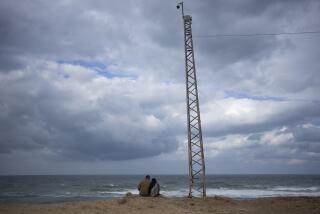Cash running out for refugee aid as European crisis grows, UN says
- Share via
GENEVA The outpouring of sympathy and expressions of concern for the plight of hundreds of thousands who’ve fled the Syrian civil war to reach Europe has not translated into financial support for international humanitarian aid intended to help the refugees still in the countries that border Syria.
U.N. officials this week said that their calls for contributions to provide food, shelter and clothing to the estimated 12 million Syrians displaced by the conflict, including 4 million who’ve fled to Jordan, Lebanon and Turkey, remain largely unanswered.
Adrian Edwards, a spokesman for the U.N. High Commissioner for Refugees, told McClatchy that to date his agency has collected only 41 percent of the $4.5 billion the agency says it needs to provide assistance to Syrians in neighboring countries.
“Clearly the growing funding crunch for humanitarian operations in the Syrian region is becoming a growing concern,” Edwards said. “Support for refugees and communities there is vital for maintaining a sustainable asylum situation for the millions of refugees in that region.”
Other U.N. agencies also are reporting funding shortfalls that may be contributing to pushing Syrians to try their luck with the arduous flight to Europe. The World Food Program reported that it had cut by half the value of vouchers that it provides to 1.3 million Syrians in the region.
“With the value of food vouchers reduced, most refugees are now living on around 50 cents a day,” said Bettina Luscher, a World Food Program spokeswoman.
The agency needs $333 million immediately, Luscher said, “to continue to providing a lifeline to Syrians affected by the conflict until the end of the year.”
Another U.N. agency, the International Organizations for Migration, it’s only collected 11 percent of the 143.4 million it’s requested from donors to help Syrian refugees.
How much international aid shortfalls have contributed to the refugee crisis in Syria is impossible to know. The U.N. refugee agency said Friday that it has counted 442,421 refugees and migrants arriving in Europe by sea, of which 51 percent are Syrians. The vast majority, about 72 percent, arrived in Greece by boat across the Aegean Sea. The remainder landed in Italy after crossing the Mediterranean.
After Syrians, the largest group of refugees are Iraqis, who make up 35 percent, followed by Afghans, at 13 percent; Eritreans, 8 percent; Nigerians, 4 percent; Somalis, 4 percent; and Pakistanis, 3 percent.
U.N. officials have been complaining for years that their requests for more help to provide assistance for Syrians have gone unanswered.
According to the U.N. Office for Humanitarian Affairs, the U.N. collected only 65 percent of what it needed to provide humanitarian assistance in 2013. This year, the rate is only 40 percent.
“The lack of funding for humanitarian operations continues to be a major challenge,” Stephen O’Brien, the U.N.’s top emergency relief coordinator, told the U.N. Security Council on Wednesday. “I appreciate the generosity of donors in 2015 already and ask them to consider making additional pledges, given the extraordinary level of need we are facing.”
Whether that will happen is uncertain, however. Asked about the funding gap, Archbishop Silvano Tomasi, the Vatican’s permanent representative to the U.N. in Geneva, said donors are tired of repeated requests for ever-increasing amounts of money.
“That is a psychological factor that cannot be used as an excuse, in my opinion,” he said.
Jan Egeland, secretary-general of the influential Norwegian Refugee Council and a former U.N. emergency relief coordinator, said governments have provided too little money for humanitarian relief worldwide over the past two years, even as the number of displaced has skyrocketed worldwide.
“We have gone from 40 million to 60 million displaced people worldwide in just a few years,” he said. Refugee assistance, even in the seemingly staggering amounts sought now, remains just a tiny fraction of the economies of the countries now besieged by refugee flows, he said.
Assistance for Syrians is not the only aid area where funds are short. According to U.N. data, only 37 percent of the $1.6 billion appeal for Yemen has been funded and only 50 percent of the $704 million appeal for Iraq.
(Zarocostas is a McClatchy special correspondent.)
(c)2015 McClatchy Washington Bureau
Visit the McClatchy Washington Bureau at www.mcclatchydc.com
Distributed by Tribune Content Agency, LLC.
More to Read
Sign up for Essential California
The most important California stories and recommendations in your inbox every morning.
You may occasionally receive promotional content from the Los Angeles Times.










